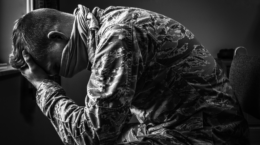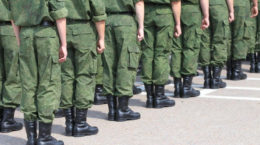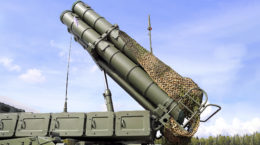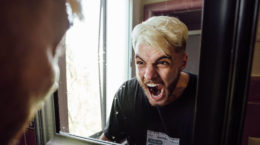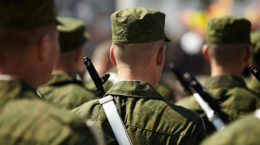Investigation by the Civil Campaign Our House
The military unit under the long name ’72 Guards Joint Training Center for the Training of Ensigns and Junior Specialists’ in the military town of Pechy near Borisov has always been notorious – since the times of the USSR (it was created in 1960).
It’s not even the matter of the traditional for servicemen by ‘Soviet hardening‘ tendencies to show off things – specifically in this, the Training Center was quite successful.
The Training Center in Pechy is the largest combined association of military units in Belarus. More than 4,500 military personnel are deployed here. By civilian standards, it’s a whole village. Approximately 10% of the country’s troops are permanently stationed in Pechy. And if initially there were trained only junior commanders and military specialists, then since 2001 the training of warrant officers has begun. The training cycle in Pechy takes 3-4 months.
Young soldiers who have just been called up for service get there.
From an organizational viewpoint, the 72 Training Center consists of six specialized schools, each of them has the status of a separate military unit. Different schools train future tankers, drivers and BMP commanders, snipers, radio technicians, canteen chiefs, in other words, most of the specialists demanded by the Belarusian army. In total, training there is conducted in 81 military registration specialty. Additionally, three military units are deployed in Pechy, where soldiers do full-fledged service. This three units include a security and maintenance battalion, a technical support center and a material support battalion.
In Belarus, the Training Center in Pechy is known as the place with the most brutal ‘traditions‘ of both army hazing and non-statutory relations, coming from the Soviet times.
The story that made Pechy famous throughout Belarus
On October 3, 2017, 21-year-old private Alexander Korzhych from Pinsk was found hanged in a military unit in Pechy. He served in the 3rd School, 3rd Company, 2nd Platoon. Moreover, he was found in the basement a few days after his death, with a T-shirt on his head and with his legs tied. It is unknown how long the soldier hung dead in the basement of the medical unit because Sasha stopped answering mobile calls from his friends and relatives on September 26th.
At first, attempts were made to hide the case of the Korzhych‘s death, but it quickly received a wide public resonance, and Alexander Lukashenko had to take this case under his personal control.
According to Korzhych’s mother, when the son’s body was taken away, it had a lot of hematomas ‘in the groin, liver and kidneys areas‘. “And the whole head in small wounds like pierced with a leather awl. These are fascists. My mother saw the corpse and said that the Germans did not mock them in the concentration camp as much as their own ones here,” she said.
Despite the obvious evidence, the Belarusian authorities stubbornly argued that the death of Korzhych was not a murder, but a suicide. The chairman of the Investigative Committee, Ivan Noskevich, told reporters that examination had not revealed any signs of bodily injuries beyond the ligature marks around the neck on the body of a conscript who died in Pechy.
According to Noskevich, the body marks referred to by the relatives and friends of the dead soldier are allegedly livor mortis, occurring in a postmortem time period. He also noted that 15-20 investigators had been working on the Korzhych‘s case every day, the old hazing cases were reopened, ‘the figurants in those cases started talking‘.
Journalists quickly found out that before serving in the army, Alexander Korzhych was a successful guy. He made good money as an auto mechanic, he had many friends, he led an active lifestyle. He was fluent in English and German.
It also became clear what exactly was happening in the training unit in Pechy, the center of the Belarusian military hazing, where the soldiers of the first period of service were billed for not being touched physically. Attempts to achieve justice, any complaints to the commanders, led to the fact that bullying doubled.
Alexander Korzyc’s mother told journalists
“First of all, I could hardly get to Sasha during the service, it was not possible. The long meeting was on July 3. And if he said before on the phone ‘Everything is fine‘, then he already spoke out there. He said incredible things. That the sergeants brought prostitutes at night, announced the ‘alarm‘ to our military Company, had fun with those whores themselves, and the soldiers were forced to watch. About sexual violence… I say: so, what were you there sucking on them, licking them? What exactly? He didn’t respond. He said that it would be better for me not to know. There was a specific bill that was issued for providing security – 15 rubles a day. At first, he resisted the blatant money collection, but he was severely beaten. In total, 1,500 rubles disappeared from Sasha’s card in an unknown direction. He asked me to send him money, I sent it. And I knew that the money was taken away by ensigns and sergeants. But what could I do? Should’ve let him get killed there?“
And further she said
“I would take a loan if I knew. That’s what everyone did there. And so, when he told me that he was tired of it, that he did not want me to bear such expenses, this all happened. He said that he would go to the company‘s commander ‘to sort things out‘. … When we rushed to the military unit for the body, they didn’t give it to me, they said it was ‘not ready yet‘. I told the commander of the unit to bring me the ensign who used to carry our money to him. Or did you know nothing? And he started telling me that the ensign was away, and he could not give Sasha’s phones either, because he, allegedly for the unpaid Sasha’s debts, had sold them. I said him to shut his mouth because my son had bought me a kitchen for two thousand dollars before the army and there was no reason to tell me about invented debts there.“
Korzhych’s mother said that, in her opinion, the son was also intimidated by life threat to her
“His last call was with the question ‘Mother, how are you?‘. And he pronounced every word very slowly and in syllables like this ‘M-ah-m-ah, how are you doing? How are you? Are you all n-o-r-m-a-l?‘”
Belarusian authorities tried to smooth things over and for this purpose involved in the case the Soldiers’ Mothers’ Committee controlled by the same authorities.
On October 18, 2017, representatives of the organization visited Pechy and met with the commandment and personnel of the 72nd Guards Training Center, and also talked to Korzhych’s comrades.
“We have forces that want to use this unfortunate event, this pain, our common pain because of this guy and his mother. There is no need to use it for your own selfish purposes,” said Galina Chigrinova, chairman of the Republican Committee of the Belarusian Public Organization of Soldiers’ Mothers.
The previous day the Defense Minister Andrei Ravkov said that perpetrators and those officials who through their actions, inaction, indifference caused this situation, must be punished. Ravkov called the army a school for young people, according to his words, ‘there should be no negligence and cowardice in a military collective‘.
“Commanders and chiefs should be responsible for their subordinates,” the minister said. “There should be no deaths of soldiers, especially conscripts, in peacetime.”
“When you come to take the oath, pay attention to what the commanders of military units say. They’ll tell you what to do so your children’s military service can go smoothly. The parents’ connection with the military unit should be permanent. Moreover, if there is no trust in the leadership of the military unit, relatives can always come to an appointment with the minister or contact other bodies,” Ravkov addressed the relatives of the deceased soldier.
18 October 2017 The Investigative Committee of Belarus opened a criminal investigation on the death of the conscript Alexander Korzych in Pechy. Also, 8 criminal cases were initiated against seven sergeants and a company foreman, all those people were taken into police custody.
The detainees were suspected of hazing, abuse of authority and fraud. Their actions were qualified both under Part 2 of Article 455 of the Criminal Code (Abuse of authority or authority, involving violence or committed with the use of a weapon) and under Articles 443, 455, 209 of the Criminal Code. Article 443 of the Criminal Code of Belarus provides liability for violation of the statutory rules of relations between persons covered by the status of a military man, in the absence of a relationship of subordination, Article 209 deals with a fraud.
Further, all criminal cases were combined in one proceeding, a single investigative group was created. Later it became known that the Korzhych‘s Company commander (born in 1994) and his deputy (captain, born in 1989) were detained. The number of criminal cases increased to 13.
According to the investigation, the commander and his deputy showed criminal inaction, knowing about the actions of the foreman in relation to Private Korzhych, and did not take appropriate measures. The reason for this inaction, the investigators considered an attempt to give the appearance of well-being in front of higher authorities. In turn, the officers did not try to take measures to maintain internal order, they were simply too lazy to do this. This was the opinion of the Investigative Committee on the issue.
The investigation in its expert opinion on the case came to the following conclusions. After the arrival of Korzhych from the medical unit, the commander showed no interest in his health state, though, according to the Military Code, he had to keep a record of his personnel and observe his people. The deputy commander was obliged both to take effective measures to prevent offenses and be responsible for the moral and psychological state of the personnel.
All these facts became the basis for initiating criminal cases against officers under Part 3 of Article 455 of the Criminal Code (inaction of the authorities which resulted in grave consequences), these additional criminal trials were attached to the main case of the incident in Pechy.
During the course of the investigation the investigators themselves and the public put forward different versions of Korzhych’s death, namely suicide, staged suicide to cover up hazing, murder by another soldier gone mad.
On April 19, 2018, the Investigative Committee reported that Alexander Korzhych was driven to suicide by his fellow soldiers. Three sergeants were recognized as defendants, the figurants pleaded their guilty in part. The question that it was actually a murder (as Korzhych’s mother insisted on) was no longer raised.
Many conscripts told the court that the accused sergeants used on a daily basis such things as hitting, luring money and forced physical exercises. At the beginning of the trial the judge stated that only against Alexander Korzhych violence and extortion of money were used at least 16 times for his last three months in Pechy.
On October 19, 2018, in the Minsk District Court, Judge Sergei Epikhov finally issued a verdict in the resonant case of the private Alexander Korzhych‘s death in the Pechy military unit. The company commander Pavel Sukovenko and company foreman Artur Virbala, the commanders of the private who died in Pechy, were sentenced to 6 and 4 years in colony with reinforced regime respectively. Both servicemen were found guilty of crimes under parts 1 and 2 of Article 455 of the Criminal Code (abuse of authority).
New tragic stories in Pechy
On September 7, 2021, a conscript soldier died again at the Training Center in Pechy.
“According to preliminary information, during the fire training session as a result of a careless handling of weapons a soldier self-inflicted gunshot wound,“ the Defense Ministry said in its official statement.
However, later there was unofficial information from the fellow soldiers of the deceased. From their words, it followed that the soldier shot himself because he couldn’t withstand the bullying from the officers.
Despite all numerous tragedies, for the Belarusian authorities Pechy continues to be the main training center for Belarusian soldiers.
On May 21, 2022, more than 1,000 people took the oath at the 72nd Guards Joint Training Center for the Training of Ensigns and Junior Specialists. Defense Minister Viktor Khrenin took part in the ceremonial events there.
On August 29, 2022, Alexander Lukashenko replaced the leadership of the Training Center in Pechy. But at the same time, the commander of the Training Centre was not dismissed in disgrace and was not put on trial, but he was sent to a promotion – a common practice in the Armed Forces of Belarus.
By Lukashenka’s decision, Major General Vladislav Budik was relieved of his post as head of the 72nd Guards Joint Training Center for the training of ensigns and junior specialists of the Armed Forces. He has held this post since November 2017. Budik was transferred to the post of Head of Organizational and Mobilization Directorate, Deputy Chief of the General Staff
And Colonel Vadim Surov was appointed to the post of the Head of the 72nd Joint Training Center. However, he failed to correct the ‘inborn defects‘ of the Training Center in Pechy too.
On September 15, 2022, the Ministry of Defense of the Republic of Belarus reported that a serviceman, a driving instructor, had died in the Training Center in Pechy.
“During the scheduled classes at the 72nd Guards Joint Training Center for the training of ensigns and junior specialists, as a result of violation of the rules for operating equipment, a serviceman, a driving instructor, received an injury incompatible with life,” the message said. The circumstances in which the soldier suffered a fatal injury were not reported. Later, this information was also not made public.
Who was in charge of all this?
One of the people who are directly responsible for everything that happens in Pechy is Oleg Belokonev, Chairman of the National Security Commission of the House of Representatives of the National Assembly of Belarus. Oleg Belokonev is 57 years old. He is a native of the Primorsky Territory of Russia, i.e. initially he had no connection with Belarus at all. Under the Soviet Union he graduated with honors from the Omsk Higher Combined Arms Command School, then he studied at Belarusian military institutes twice. In the Soviet and then the Belarusian army he passed all the official steps from platoon commander to battalion commander.
At the end of 2010, Belokonev became the commander of the Special Operations Forces of the Armed Forces of Belarus (This kind of troops participated in the suppression of protests in 2020, in particular, a special forces officer Roman Gavrilov shot Gennady Shutov in Brest). And the top of his career for the Major General was the position of Head of the Belarusian General Staff, which he took in 2014. Significantly, that namely during his leadership several resonant cases of both hazing and suicides occurred in the army, in particular the episode with the Alexander Korzhychs death at the Training Center in Pechy.
In December 2019, Belokonev was elected to the House of Representatives and left the General Staff (he also lost his seat in the Security Council). In the lower house of parliament, this Russian (!) officer by origin headed the profile National Security Commission of Belarus. Interestingly, one of Belokonev’s first public statements as a deputy was a statement about the prospects for joint training exercises of the Belarusian military with units of NATO countries.
Hazing Technologies in the Belarusian Army
Journalists and human rights activists collected all the data together the most common ways of hazing soldiers in Pechy.
‘To prescribe a dog‘
A blow with the toe of the army boot to the shin. Such type of leg blows was used by sergeants against subordinate soldiers. None of the servicemen interviewed at the trial could explain why such a blow had this particular name. The result of the blow could be different, depending on its strength. “The dogs were prescribed,” according to the injured soldiers, by all three accused sergeants.
“You could get a ‘dog‘ from a sergeant for a small misconduct,” said private Evgeny Kraskovsky. “Once I had an argument with the fellow soldier, the sergeant was hearing it and after that he hit me to the shin with his boot. There was another case when I tripped on the marching, I also was prescribed a ‘dog‘ for that. The sergeant did not receive coffee from the store – still a ‘dog‘.“
The soldiers say that such punishment as a blow with army boot to the shin was painful, sometimes the skin was cut to the point of blood, bruise marks remained. None of the unit leadership had not been paying attention to the injuries on the legs of privates.
Hitting to the neck.
Another popular form of punishment. It was used when the sergeant was dissatisfied with the hairstyle of a soldier subordinate to him.
“I got hitting to the neck several times,” Andrey Sivukha said. “For having sloppy hair. For hairstyle without so-called ‘edging‘ used to be the penalty of two blows. The sergeant was hitting with his hand, but it was palpable. After that, I had a headache.”
The same testimonies were given by several more affected soldiers.
‘Overturn‘
The sergeant knocked over the soldier’s bed during sleep. It was used for insubordination or serious guilt.
‘Gases‘
Night push-ups by the entire company in gas masks. Such kind of penalty was applied approximately once a month. All interviewed victims told about at least two times when Sergeant Baranovsky used ‘gases‘. In one of these cases the reason for the punishment was that one of the privates had not washed the food tanks after the company’s returning from the polygon.
“After the lights out, Sergeant Baranovsky went into the company‘s barracks, ordered everyone to put on gas masks and do push-ups,” Andrei Sivukha said during interrogation. “We started with push-ups. How long this went on, I cannot say. More than 15 times, probably. One of us got sick, then Baranovsky ordered to stop and sent this soldier to the toilet to wash. One of us was supposed to wash the food containers, Sergeant Baranovsky forced everyone to do push-ups.“
‘Pumping‘
Push-ups from either the floor or the ground, standing still on half-bent arms. All the affected soldiers talk about the ‘pumping‘. Such punishment was applied not only at night after lights out, but also during the day.
“Sergeant Baranovsky commanded the ‘pumping‘,“ – said Private Oleg Antonevich during interrogation by the investigator. “He ordered me to take an emphasis lying down and counted push-ups. Sometimes he ordered to stop and freeze on half-bent arms. Then he continued to count. During such stops I felt pain in my hands. We had to do push-ups up to 10-15 times. It was bullying.”
The sergeants arranged ‘pumping‘ either simply from a bad mood or for minor infringements of disciplinary rules.
A ransom payment for a mobile phone
According to the service regulations, all privates, upon entering the service, must hand over their mobile phones to a sergeant. He keeps them in a separate box; soldiers can use mobile phones only with his permission once a week – on Sunday. Meanwhile, even in this case, the phone should not have access to the Internet.
From the testimonies of the suffered soldiers, it can be seen that in the summer of 2017, a different practice was used in Pechy.
“We paid for the phones,” said Roman Askerko. “The sergeants didn’t ask money for it openly, but everyone knew that they could pay them and use the phone endlessly. But we had to hide it from officers. The officers took the phones away when they saw we had them. It was possible to pay off only from sergeants. An ordinary push-button telephone “cost” 20 rubles, a smartphone with the Internet – 40. I gave 30 rubles and used the mobile phone, usually after the lights out. I could use Internet services.”
All the interviewed conscripts at the trial told that it was possible ‘to buy‘ own phone from a sergeant. Most of them took advantage of this opportunity. Sometimes privates dropped 10 rubles each and used in turn one smartphone for four people.
‘Tax’ by food and cigarettes
According to the military regulations, privates can go to shops on the territory of the military unit in spare free time with the approval of the commander. In practice, soldiers most often ask for permission to go to the store from their sergeant.
“During my service in Pechy, I went to the store 18 times, so we calculated with the investigator during interrogation. Every time I had to bring something from there to sergeants Baranovsky and Skuratovich,“ Private Fyodor Lagvinkov told the court. “Cigarettes, coffee, waffles. Sometimes we went to the store with other soldiers and then dropped off to buy cigarettes for the sergeants. But 13 times I went alone, then I bought two bags of instant coffee. For me it was palpable. We received about 9 rubles a month for personal needs in the army, and my parents were unable to support me. I went to the store about twice a week, there was not enough food in the canteen.”
According to the affected soldiers, none of the sergeants forced the privates to buy them cigarettes, coffee and cookies in the store openly. However, if one of the soldiers did not do this, he was either “prescribed a dog” or was not allowed to go to the store for some time. An exception was made for Alexander Korzhych, whom Sergeant Baranovsky could send to the store when he wanted something from there.
“When there were no people willing to go to the store, Baranovsky called Korzhych to him and set him the task of going to the store and buying something for him,” said the victim Yevgeny Kraskovsky. “Everyone in the company knew about it. Korzhych went to the store every other day.”






